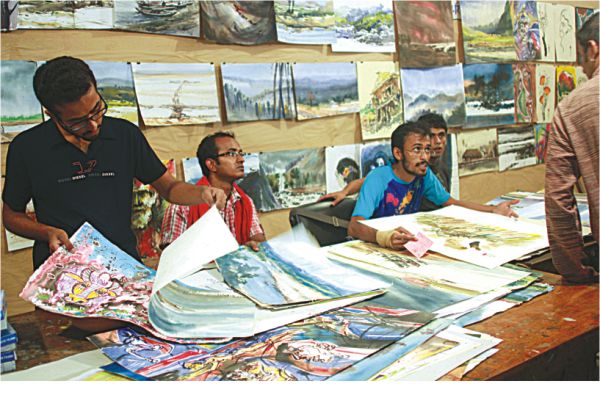|
Extra Credit
Damsel in Distress
Sabhanaz Rashid Diya
Photos: Kazi Tahsin Agaz Apurbo
My sister, very recently graduated from George Brown College in Toronto in career counselling, and as part of her internship in Bangladesh, she was asked to work with young adults, especially those nearing the end of their undergraduate courses. At the end of each day's session(s), she brings up some of her general concerns about the environment for career counselling in the country, particularly those that keep repeating themselves in almost all the conversations she has had. Unsurprisingly, those are my concerns as well, which eventually leads to this piece and perhaps the question in every employer's mind. What are young people looking for in an ideal job market and how do we make them more prepared for a more productive industry?

Campaigning for the liberal arts by career counsellors can encourage students to be unconventional.
It is common information that private universities alone produce over 3 lakh business graduates (BBA) at their undergraduate courses every year. While no exact statistics have been found, it is assumed that of this 3 lakh, less than 50 percent actually get a decent job at a multinational bank or similar, while the rest are split between going abroad for higher degrees or settling for less satisfying positions. Yet, BBA remains one of most sought after degrees in the country, with students still dreaming of 'making it big'. In spite of the assumed and ubiquitously accepted market analysis that follows graduation, it seems the number of BBA graduates still remains high. Why?
The answer vaguely came during my sister's sessions. Most admitted, quite blatantly, how they were in a BBA course because they had nowhere else to go. They did not want to go to medical school or BUET, and no other subject outside medicine, law and engineering (the sub continental career trolls) seemed apt or easily acceptable by their communities. A degree in Communication, English or Environmental Management created inspiring opportunities, but it was still difficult to explain to parents and teachers why one would invest four years behind something whose composition they were not sure of. Communication, quite directly, meant the traditional media industry; English automatically translated to thick glasses, flying white hair and becoming a professor at a university; Environmental Management meant one had to end up working at an NGO. Our communal perceptual windows are so comfortably defined that anything outside of technical knowledge is frightening, and therefore, one needs to 'protect' their loved ones from it.
However, it was not this banal notion of perceptual windows that caught my attention. It was of something much greater, more powerful and of the most alarming nature that really channelled some of the brightest and liberal minded students to pick a BBA degree over others -- Politics.

Our communal perceptual windows are so comfortably defined that anything outside of technical knowledge is frightening.
And, why not? The multinational, the bank, the private limited or the hotshot corporate were not as politically governed as any other industry. Life expectancy was by default higher in the cubicle world. One does not absolutely need to support a political party; they could just keep their hands 'clean' and apathetic. The opportunities for promotion, increments or success were not defined by one's votes at an election, rather by your merits, networking skills and relationship with the right people at both ends of the ladder. A BBA degree, thanks to perceptual windows guaranteed all that, without putting one's life on a MOST WANTED flyer, and that was incentive enough to put students at an Accounting or Finance classroom.
The epitome of this crisis was felt more strongly during my sister's sessions. Almost everyone stuttered when it came to describing their dream jobs or a basic plan for their career track. Everyone, regardless of talent or potential was afraid of taking the next big step because they were unsure of the political condition of the country. They did not know who would be in power and what that would translate into more hartals, shutting down of all private universities, indefinite cancellation of classes at public universities, revoking of license for all NGOs or utterly biased television channels. Every line posed a politically influenced threat, and it seemed young adults just could not get their minds out of it.
So, what do young adults look for in an ideal job market and how do we prepare them for more productive industries? At this point, it seems a calmer, less ubiquitous political scenario can do magic. Perhaps, more career counsellors who can put the right people in the right jobs. Or even, a little more campaigning for the liberal arts. The most important is a mutually beneficial understanding that the future is not about fate, it is about self-created opportunities. Our damsel in distress needs more right-brained visionaries-- those who think, do and take the unpredictable and the dangerous as the next possibility.
(Sabhanaz Rashid Diya is a major in Media and Communication at Independent University Bangladesh and founder of the non-profit youth organization, the One Degree Initiative Foundation.)
|
Copyright (R) thedailystar.net 2012 |
